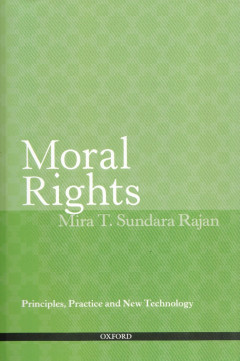Ditapis dengan
Ditemukan 1 dari pencarian Anda melalui kata kunci: subject="Hak Cipta - Hak Moral...

Moral Rights: Principles, Practice and New Technology
The doctrine of moral rights is based on the idea that authors have a special bond with their own creative work. At present, the legal status of moral rights demands clarification and assessment as never before, as the international expansion of moral rights occurs in the new environment of digital technology. Just as the survival of copyright law depends on its capacity to adapt effectively to…
- Edisi
- -
- ISBN/ISSN
- 978-0-19-539031-5
- Deskripsi Fisik
- xxii, 550 hlm. : 24 cm.
- Judul Seri
- -
- No. Panggil
- 346.048 2 RAJ m
 Karya Umum
Karya Umum  Filsafat
Filsafat  Agama
Agama  Ilmu-ilmu Sosial
Ilmu-ilmu Sosial  Bahasa
Bahasa  Ilmu-ilmu Murni
Ilmu-ilmu Murni  Ilmu-ilmu Terapan
Ilmu-ilmu Terapan  Kesenian, Hiburan, dan Olahraga
Kesenian, Hiburan, dan Olahraga  Kesusastraan
Kesusastraan  Geografi dan Sejarah
Geografi dan Sejarah